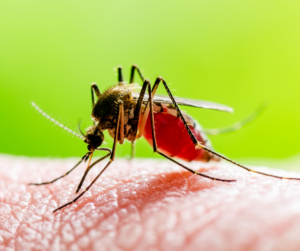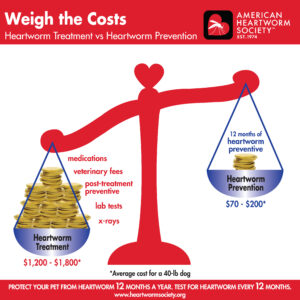Got Heartworms? Protect Your Pet from Heartworm Disease
Got heartworms? April marks National Heartworm Awareness Month, highlighting an illness that can have serious consequences for your pet. Contrary to what you may think, heartworm disease doesn't appear in just one season; it's a year-round concern. In 2023, the Companion Animal Parasite Council (CAPC) reported 195,078 cases of heartworm-positive dogs, equating to approximately 1 in every 100. Heartworm disease is preventable and treatable but also deadly. This blog aims to educate you about the nature of heartworm disease and serve as your guide to protect your pet from this preventable disease.
What is Heartworm Disease?
Heartworm disease is a serious and sometimes fatal condition that primarily affects dogs. Although uncommon, it can also affect cats and ferrets. Mosquitoes transmit heartworm disease, acting as carriers of the heartworm parasite through their bite. When an infected mosquito bites your dog, the mosquito passes microscopic heartworm larvae to the host. Once inside the host, in approximately six to seven weeks, the larvae develop into adult worms, which reside in the heart, lungs, and blood vessels.

Why should we care about a parasite carried by mosquitoes?
After heartworms reach their adult stage, they multiply perpetually, and it becomes a vicious cycle. These worms primarily reside in the heart but can also infiltrate the lungs and blood vessels, leading to severe heart and lung disease. If the host becomes overburdened with heartworms, it can be fatal to the animal.
Your Pet's Heartworm Risk
Heartworm disease is on the move, and heartworm-positive cases are increasing. The Companion Animal Parasite Council's (CAPC) website features maps showcasing this trend. However, the reported data is limited to tested pets and only reflects the cases reported by veterinarians and labs. With approximately 90 million pets in the United States, these numbers only represent a small portion of heartworm cases. Many positive cases go unreported due to a lack of testing or underreporting by labs and clinics.
The occurrence of heartworms has been notably higher in pets originating from the southern United States, often attributed to natural disasters such as hurricanes. Consequently, there has been a rise in pet rescues from those affected regions. Previously, heartworm cases were uncommon in areas like Wisconsin. However, the risk has increased with the increase in pet rescues and pets moving north.
Our clinic recently diagnosed a dog with heartworms who was a rescued pet from the southern United States. He was brought to our area by a local humane society and initially tested negative for heartworms. However, at our clinic, he tested positive. The first negative test, followed by a subsequent positive test, demonstrates the complicated life cycle of the heartworm. Many do not know there's a phase during the heartworm's life cycle when a preventative works and a phase when it doesn't. That's why it is so critical for monthly, year-round heartworm prevention.
Your Pet and Heartworms
How do you know if your pet has heartworms? If your pet is not taking a monthly heartworm prevention or there are gaps where it didn't receive it, it is at risk for heartworm disease.
Dogs
Below are some symptoms your dog may display if they have heartworms:
Cats
In cats, signs of heartworms can be subtle, and often, they won't show any symptoms. Below are some they may display:
Sadly, the first sign in some cases is sudden death. If your pet exhibits any of the above, please call your veterinarian.
Testing and Treatment for Heartworm Disease
Testing
Before your pet can start taking a heartworm preventative, it needs to be tested for heartworms. It's unsafe to give preventatives to an animal already infected with heartworms.

At Buddy's Vets, we use a 4DX SNAP test, which screens for blood parasites and examines four key elements. This blood test identifies a protein produced by adult female heartworms, indicating infection.
As we noted earlier, there are phases in the parasite's life cycle where it may not show up on tests. In order for an animal to stay on heartworm prevention, it needs to be tested every year. It's in the best interest of the bet because despite how effective heartworm prevention is, no medication is 100% effective. Prevention can fail. Owners can lapse in giving preventatives. Therefore, yearly screening is required to detect potential heartworm infections promptly and effectively maintain preventive measures.
Treatment
If your pet is diagnosed with heartworm, treatment options are available. Treating heartworm disease isn't easy and can be dangerous for your pet. The medication used to kill the adult worms is essentially arsenic-based. After the worms die, they remain in the blood vessels and dissolve. This process can trigger an inflammatory response in your pet, and there's a risk of the dead worms breaking off and causing complications such as embolisms in the lungs or blood vessels, potentially leading to death.
In addition, the medication used for heartworm treatment is costly. Treating a heartworm-positive dog can cost around $1,200, more than the average heartworm prevention cost of about $70 to $200. Getting the necessary medication for treatment can also be challenging as it is not always readily available.
With the cost and risks associated with heartworm treatment, prevention is crucial. Heartworm disease is entirely preventable, so having your pet on monthly heartworm prevention is necessary. Pets can die from heartworms and from treating heartworms.
Entirely Preventable
Heartworms are 100% preventable if your pet is on heartworm prevention. Heartworm disease is not a seasonal disease. There is no designated "mosquito season." Remember that mosquitoes start to hatch at 50 degrees, and in Wisconsin and most of the Midwest, there are a lot of mosquitoes. Even if mosquitoes aren't currently active due to the temperature, they'll emerge when the temperature is right, which is why it's critical to have your pet on year-round prevention.
Heartworms can cause significant damage to your pet, including heart and lung disease. It can be fatal if left untreated, so preventive measures are essential regardless of the season.
You can help protect your pet from developing heartworm disease by giving a heartworm preventive prescribed by your veterinarian. It is essential that you follow your veterinarian's directions regarding the product.

Heartworm preventatives should be used year round, given once per month. It's important to be consistent in giving your pet their monthly dosage, as they work backward, to ensure your pet is protected 100% of the time.
There are many heartworm preventatives on the market. Always consult with your veterinarian about the product they recommend, and always purchase your preventatives through your veterinarian.
Why year-round?
Heartworm prevention is essential year-round because it works backward. For example, if you give a heartworm preventative in November, it's effectively deworming for October. However, if you miss some months, let's say starting in November and starting again in April or May, there's a gap of about six months where your pet isn't protected. Heartworm larvae from September could mature into adult worms, resulting in a positive test when screened in May.
These preventatives target baby heartworms, known as microfilaria. However, once these larvae progress beyond certain life stages, preventatives lose their effectiveness. Therefore, year-round, consistent monthly administration is vital to combat the six-month transition from baby heartworm to adult.
Even in colder climates, heartworms remain a risk, as fluctuating temperatures in winter and spring can trigger mosquito activity, posing a threat to pets. Ultimately, year-round prevention is imperative to safeguard pets from heartworm disease, as it ensures continuous protection
Just Say No to Heartworms
Just say no to heartworms. Heartworm disease can have serious, even fatal, consequences for your pet. Heartworms don't confine themselves to just one season, so prevention is not just a suggestion; it's a necessity for your pet. By being proactive and consistent with your pet's heartworm prevention, you can safeguard your pet and reduce their risk of heartworm disease. It's not just heartworms that can harm your pet. To learn more about general disease prevention for your pet, check out our comprehensive guide here.
Remember, in the long run, prevention is safer and less costly than treating heartworms. If your pet is not currently on a heartworm preventative, contact Buddy's Vets today or your local veterinarian to get that process started.


